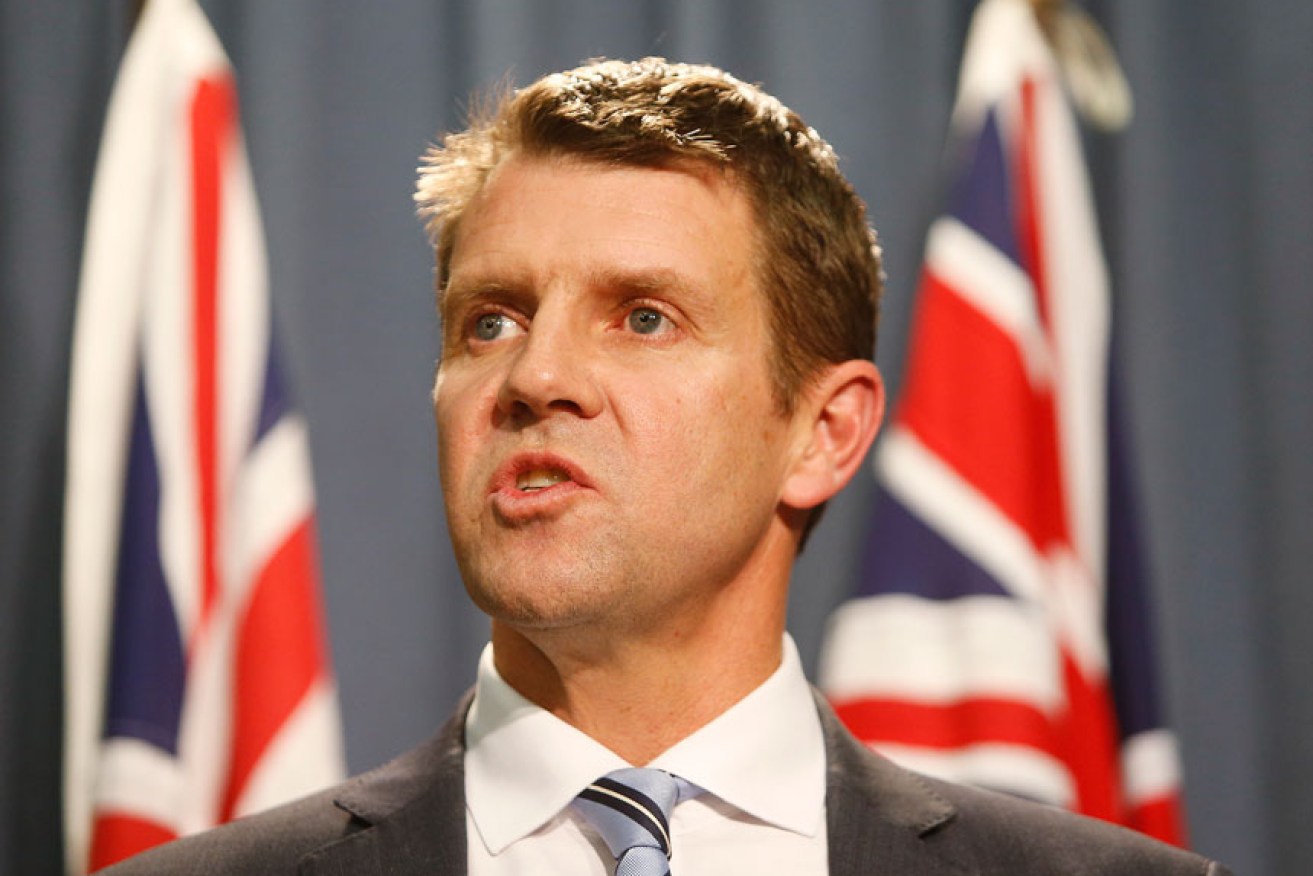Federal ICAC: Calls for anti-corruption body after NSW scandals


Mike Baird has stood by the changes to ICAC despite accusations he had ulterior motives. Photo: AAP
A news photographer’s snap of Sydney power broker Eddie Obeid shaking hands with Independent Commission Against Corruption (ICAC) target Margaret Cunneen said it all.
There was Mr Obeid warmly meeting deputy Crown prosecutor Margaret Cunneen SC whose monumental legal battle with the New South Wales ICAC had become the political battering ram by which the Baird Government has removed the chief corruption buster herself, ICAC Commissioner Megan Latham SC.
Commissioner Latham has resigned, effective next Wednesday, after the NSW government, without consultation, restructured ICAC into a three-commissioner committee which did not include her. But she could apply for one of the slots if she chose.
Ms Latham complained in a public statement that the restructure “represents an unprecedented attack on the independence and effectiveness of the Commission as a leading anti-corruption agency”.

Margaret Cunneen and Eddie Obeid shake hands in February 2016. Photo: Nick Moir/Fairfax Media
The three headed model emerged from a parliamentary committee which examined ICAC’s legal tussle with Margaret Cunneen who was under investigation for alleged perversion of the course of justice – allegedly counselling a relative to fake chest pains to avoid a road side alcohol test.
ICAC had been supplied with telephone intercepts from the Australian Crime Commission and since “perverting the course of justice” met the ICAC Act’s definition of corrupt conduct, it set to work.
Ms Cunneen challenged and eventually won in the High Court in what is now a very contentious majority judgement.
Significantly the parliamentary committee examining ICAC vs Cunneen rejected Ms Latham’s request to table the Cunneen intercepts. She wanted to demonstrate that her statutory duty to investigate Cunneen was based on the probative evidence available and was not personal or vindictive, as some Cunneen supporters in politics, the Sydney legal and media milieu vociferously claimed.
Its back to Rum Corps rules as corruption buster … busted.
After the tumult and shouting over Commissioner Latham’s resignation the politics of what has happened will resonate federally.
Labor Opposition leader Luke Foley, who once gave evidence to ICAC against former Labor minister Ian Macdonald, told The New Daily that as ICAC’s evidentiary leads on slush fund political corruption have gone across the state border to Canberra, the case for a national integrity commission was strengthened.
Mr Foley said he would raise the need for a federal ICAC with federal Labor leader Bill Shorten. ICAC’s operation Credo report into the entity Australian Water Holdings and its cross-party influence including with Liberal Party lobbyists has been delayed pending criminal trials.
Former PM Tony Abbott has raised corruption risk within the Liberal Party through the influence of power broker lobbyists with his party’s governing bodies.
Mr Foley said sunlight was the best antidote to any vested interest influence peddling. The major concern with Baird government ‘reforms’ was over ICAC’s power to conduct public hearings. Under the three commissioner model public hearings would require a majority 2-1 vote.

Luke Foley said ICAC had been a positive thing for NSW Labor. Photo: AAP
“The 28 year bi-partisanship consensus in the New South Wales parliament to support a strong ICAC is over. Baird ended it this week by eliminating Commissioner Latham with extreme prejudice.
“I mean this is the sort of thing that would happen in a third world banana republic. I’ll spend every day between now and the election (2019) reminding the public that this premier and this government have sacked the ICAC commissioner for having the temerity to look at corruption inside the Liberal Party and we’ll go to the next election with a strong policy to restore ICAC’s power”, Mr Foley said.
ICAC’s exposure of NSW Labor over the last 10 years almost destroyed Labor’s traditional support base, reducing the party to 11 lower house MPs at the 2011 state election. Party numbers are now at 34, Coalition 53 with six cross benchers.
“You know what? ICAC’s been a good thing for NSW Labor. It forced us to clean up our act, to act against a small cabal who disgraced themselves and frankly the Labor Party. It was a good thing for the Labor Party”.
Premier Baird has rejected claims he was motivated to move against ICAC and its sitting commissioner over any need to cover-up or protect the Liberal Party from investigation. Nor was he motivated by reprisal pushed by more than a dozen Liberal MPs whose careers have been destroyed by ICAC.

Ms Latham resigned, instead of re-applying for her job. Photo: AAP
The changes were needed, the Premier said, to secure procedural fairness following major inquiries into ICAC’s functions.
So who appoints the brand new corruption busters?
The government will now advertise for judicially qualified applicants to fill the three new commissioner positions..
NSW shadow attorney general Paul Lynch has told The New Daily that under Section 5A of the ICAC Act the government dominated parliamentary committee has a veto power on such appointments.
“This needs to be looked at,” Mr Lynch said.
In answer to the question that ICAC Commissioner Latham had brought the ‘reforms’ upon herself through a misjudgement in pursuing Margaret Cunneen, Mr Lynch said: “That is not the case. If the government wanted to justify Commissioner Latham’s removal over the Cunneen matter it should have moved an address in both houses of parliament for the removal of the commissioner as required by the ICAC Act. It did not.”
This was a politically motivated act.








